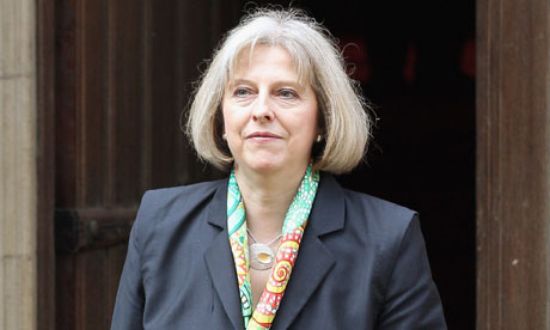|
Home secretary tells Leveson inquiry that laying down laws to
control the press might lead to 'unintended
consequences'
 |
|
Leveson inquiry: Theresa May
warned that statutory regulation could
impinge on freedom. Photograph: Oli Scarff/Getty
Images |
The home secretary, Theresa May, has questioned Lord Justice
Leveson's suggestion that a form of statutory regulation
of the press will be needed.
May told the Leveson inquiry in Tuesday she was concerned that
laying down laws to control the press would "encroach on
freedom" and lead to "unintended consequences".
Initially she told Leveson she would not rule out statutory backing
for a replacement for the Press Complaints Commission,
but quickly added that she would not like to see a new
body "hampering the important fundamental principle of
freedom".
When it was put to her that the new press regulation body might
need a "statutory underpinning" to enable its decisions
to carry legal weight in potential libel or privacy
actions taken to the high court, she replied: "The
statutory backing for a body that is otherwise
completely separate from government, I think there are –
I naturally worry about the law of unintended
consequences ... and the extent to which that's then
taken as a means to encroach on freedom through
regulation of content."
Leveson reiterated that he was not seeking to regulate the content
of the press.
On Monday, towards the end of Tony Blair's appearance at the
inquiry, Leveson outlined some of his initial thinking
on the future of press regulation, telling the former
prime minister that any successor to the PCC would have
to be independent of the industry as well of the state.
On Tuesday, May also denied that the former News International
chief executive, Rebekah Brooks, put her under pressure
to reopen Madeleine McCann investigation.
May told the Leveson inquiry that she had spoken to both Brooks and
the editor of the Sun, Dominic Mohan, about the McCann
case on 11 May last year.
Robert Jay QC, counsel to the inquiry, suggested the review was
ordered at short notice and "maybe the same day".
May said it was not ordered at short notice, adding that the Home
Office had been in discussion about the possibility of a
police review for some time, even under the previous
government.
Jay asked: "Did Mrs Brooks say anything, words to this effect, that
unless you ordered the review you would be on the front
page of the Sun until that happened?"
May replied: "No, neither Mrs Brooks nor Mr Mohan made any
indication of that sort to me. The nature of the
telephone conversation was to alert them to the fact
that the government was taking some action, that there
was going to be this further work by the police here in
the UK."
Asked whether May had discussed the issue with David Cameron on or
around 11 May, the home secretary said: "I don't recall
having a specific discussion with the prime minister. I
know the prime minister was interested in this specific
issue but I don't recall whether I had a specific
conversation with him."
May confirmed it was a telephone conversation "at my instigation".
Brooks was asked about the McCann review when she appeared at the
inquiry on 11 May.
Asked whether there was an ultimatum or threat to the home
secretary, Brooks told the inquiry: "I'm pretty sure
there will not have been a threat, but you will have to
ask Dominic Mohan."
Brooks said it was not true that she had intervened personally with
the prime minister and threatened to put May on the
front page until the paper's demands were met.
"I did not say to the prime minister we would put Theresa May on
the front page every day. If I'd had any conversations
with No 10 directly they would not have been
particularly about that," she said. |


